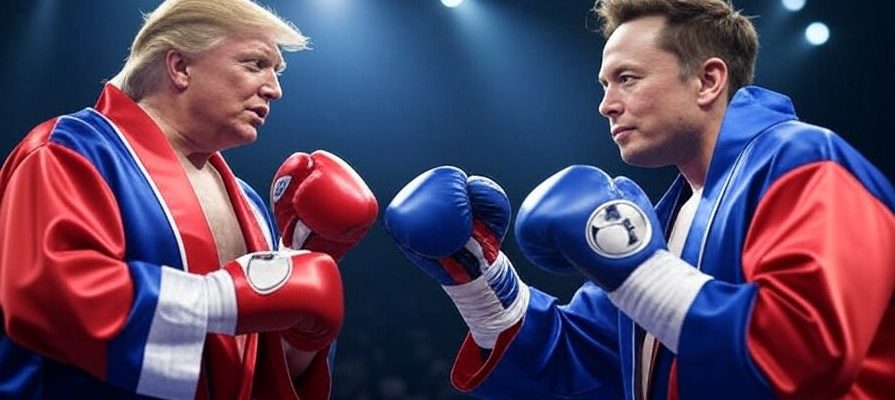This weekend, Donald Trump and Elon Musk “broke up” in a very public spat. Ironically, it took place as a back-and-forth on the men’s respective platforms, X and TruthSocial. In many ways, this was inevitable. These are two of the most powerful men on earth, and everyone wondered from the start if Musk could play second fiddle to Trump for long and whether their two egos would eventually clash. The answers: no and yes.
The post-mortem on their alliance brings up some interesting observations for people in general, for Republicans, and for Democrats.
A general lesson that emerges from their clash is the importance of maintaining equilibrium in one’s relationships and emotions. The great Dennis Prager (whose recovery we pray for constantly) made an observation during the Happiness Hour segment of his show that I’ll paraphrase here. Prager posited that it’s important to regulate one’s highs and lows, avoiding the extremes when possible. During your happy times, enjoy the moment, but don’t throw yourself into ecstasy. During your dark times, try not to descend into despair. This avoids a yo-yo effect and keeps you in a healthy state of regulated emotion.
When I think of Musk’s posts from just the past couple of months, they highlight the extremes. He went from the famous statement, “I love President Donald Trump as much as a straight man can love another man” in February to the (now deleted) Epstein “bomb” and impeachment retweet a couple of days ago in June: extreme adoration to total hostility. For his part, Trump had such effusive affection for Musk that he took him everywhere and gave him a significant role in the administration. The idealization these men had for each other, mixed with the incredible political pressure they were under, combined to create a more volatile split. A slower start might have led to a cooler end.
This leads into the lessons for Republicans:
It strikes me that Trump could have benefited from the old adage popularized by one of his heroes, Ronald Reagan: “Dance with the one that brung ya.” While I would not expect Trump to cater his legislative goals to Musk, it does seem that there was some disconnect between the goals of D.O.G.E. and the legislative realities of a closely split Congress. Elon, ever the visionary and idealist, expected instant change across government, and he gave up a great deal to try to make it happen. Given the personal and political toll it took for Elon to throw his support behind Trump, it seems that Trump should at least have made clear to Elon that progress would not be instant. He also should have thrown Elon a bone (such as not withdrawing the Jared Isaacman nomination for NASA or insisting upon D.O.G.E. cuts being included in the “Big Beautiful Bill”).
Elon’s emotional and unregulated reaction to his disappointment also presents a bigger question: were Democrats right to say that Elon never should have been given so much power? Given the alacrity with which he threw Donald Trump under the bus, the PR nightmare he created, and concerns about what other trouble he could potentially cause with information he’s been privy to, it’s a very fair question and one that will become more clear in the coming days.
Although I support the work of D.O.G.E. and even think Elon was the right guy for the job, we need to ask now whether his access to the president and the government was too much all at once? A slower and more methodical process would have been a challenge due to Musk’s other responsibilities and the general slog of government (in)efficiency, so I understand why Trump jumped into the deep end of the pool with him, but it also has its downsides. D.O.G.E. exposed some deep governmental corruption. Was it worth the cost of dealing with the mercurial Musk? That’s a question for thoughtful reflection.
Republicans will be dealing with this fallout, but Democrats shouldn’t be without self-reflection, either.
There is no other word but hysteria for the Democrat reaction to Musk’s involvement in the Trump administration. While some of their concerns might have been valid, such as the one mentioned above about Musk’s access, many of them were overblown. Now that Musk and Trump are divided, will there be any reflection about the claims that Musk was a “shadow president?” It’s very clear now that Musk’s money did not and could not buy off President Trump, who will always do exactly what he wants to do, so the “Stop Oligarchy” tours being led to stir up the base look even sillier now. Has the oligarchy been stopped merely because of a battle on X? No, because the oligarchy was never in control. Musk always worked at the president’s pleasure, and now that they’ve incurred each other’s displeasure, they’ll presumably work in their separate realms.
These Democrat and media talking points were not without consequence. How many Tesla owners had their property vandalized? How many showrooms were destroyed? How many people sold their cars because they were afraid of violence? How many shareholders lost money? Now it’s all moot because a mere 5 months later (right on the schedule that was always laid out by the administration), Musk has gone his separate way. People panicked for nothing. Property was damaged for nothing. People will serve prison sentences for nothing.
In the end, the overarching lesson common to every group is caution. The president probably should have kept Musk at more of a distance. Elon should have shown more self-restraint in his public disagreement. The Democrats shouldn’t have whipped their followers into a violent panic.
The short-term effect of the end of this alliance will be a few weeks of drama and headaches for Republicans (or maybe less with the speed of this news cycle and the rioting in Los Angeles). I hope that the long-term effect will still be a net positive. The structure created by Musk will allow D.O.G.E. to continue with its objectives to be a watchdog for government waste and corruption. And who knows, maybe we’ll finally see that Epstein list?
The friendship between these two men helped form a coalition of Republicans and libertarians that will exist beyond its dissolution, and that was probably worth the price.
Thanks for reading, and don't forget to Click here to Subscribe!About the Author

|
Jackie Chea is a blogger from San Antonio, Texas who holds a B.A. in Psychology and an M.A. in Community Counseling from the University of Texas at San Antonio. She writes on political and cultural issues from a conservative, religious standpoint. She lives in the Lone Star State with her husband, Nick, and their 7-year-old son, Lincoln. |


Facebook Comments